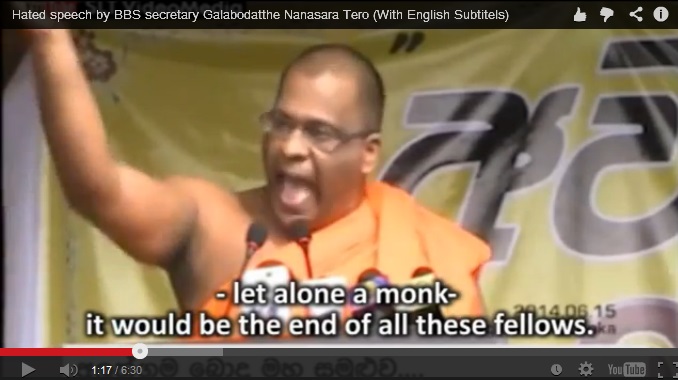At least four people have been killed [2], 78 people injured and a number of Muslim shops and homes torched in recent clashes between Muslims and hardline Buddhists in the Sri Lankan coastal city of Aluthgama [3], but don't expect to learn much about it from Sri Lanka's mainstream media.
Those news outlets provided little to no mention of the unfolding violence, according to Ayesha Perera [4] for Indian citizen media site Firstpost. Groundviews [5], an award-winning alternative citizen journalism site based in Sri Lanka's capital Colombo, reported the “reasons range from orders from higher-powers to self-censorship over fear of pushback.” They took screen captures [6] of some of the major newspapers as the riots were happening to prove the point.
In the absence of local coverage, social media [5] and international news outlets have become the dependable sources for information. On Twitter, reports on the violence were shared using the hashtag #Aluthgama [7].
Fire services struggling to control another Muslim shop on fire #lka [8] #aluthgama [9] pic.twitter.com/hni2QOYG7j [10]
— Dinouk Colombage (@Dinoukc) June 16, 2014 [11]
Third day. Lack of political leadership is appalling. So is police incompetence and moral cowardice of Buddhist Mahanayakes. #Aluthgama [12]
— Vidura (@Apelankawe) June 17, 2014 [13]
Assistance/help to those affected by communal violence in Sri Lanka south town #Aluthgama [12] still very much community based
— Amantha (@AmanthaP) June 17, 2014 [14]
Tension in Aluthgama was already boiling before the clashes, fueled by reports [15] that a Muslim man allegedly attacked a Buddhist monk. After local Sinhalese Buddhists protested police inaction on June 12, 2014, authorities arrested [16] a suspect and two others, and the situation appeared to die down.
But Buddhist nationalist organization Bodu Bala Sena (BBS) [17] revived the anger on June 15 with a rally in Aluthgama. The group's secretary Galagodaaththe Gnanasara Thero, a Buddhist monk, delivered a fiery speech against the Muslim community [18]. He said regarding the heavy police presence in the area:
I would like to say that it is Sinhala Police in this country. And the army in this country is Sinhala Army. Hereafter, if a Marakkalaya (offensive way of addressing Muslims) or any other Paraya (another abusive way of addressing foreigners) keeps so much as a hand on a Sinhala Person, let alone a Monk, it would be the end of all these fellows.
YouTube user Sri Lankan Expat uploaded the speech [19] with English subtitles:
After the rally, BBS supporters marched into Muslim-majority areas [20] chanting anti-Muslim slogans, and clashes eventually broke out [21]. Several Muslim shops and homes as well as a mosque were vandalized or torched [22]. The violence continued throughout the night [23], leaving three Muslims dead. Thousands of Muslims took refuge [24] in nearby schools and other shelters.
The following night, a 58-year-old Tamil was mistaken to be a Muslim and flogged to death, bringing the count of those killed to four, according to the Colombo Telegraph [25].
The Foreign Correspondents Association of Sri Lanka posted photos to its Facebook page [26] showing the devastation. BBC correspondent in Sri Lanka Charles Haviland tweeted photos as well:
Burnt-out Lanka Motors sales store #Aluthgama [12] #SriLanka [27] after anti-Muslim violence by hardline Buddhists. pic.twitter.com/SVry1TR4cE [28]
— Charles Haviland (@cfhaviland) June 16, 2014 [29]
The Sri Lankan authorities imposed curfew [20] in Aluthgama and the nearby Muslim majority Beruwala town to ease tensions. BBS, which maintains it was protesting peacefully but was pelted by rocks, blamed the police [30] for the riots in Aluthgama and warned, “Do not make us have to tell the people to boycott Muslim businesses.”
Muslims make up 10 percent of Sri Lanka's mainly Buddhist population. Over decades, Muslims in Sri Lanka have been living peacefully amongst a largely accommodating Sinhalese and Tamil population. However, in recent years, anti-Muslim sentiment [31] has been on a rapid rise amongst sections of the political class.
The phenomenon is simultaneous with a rise of Buddhist extremism [32]. BBS has made headlines since 2012 for a number of violent protests and attacks against Muslims. The group succeeded last year in making authorities drop Muslim halal labeling [33] and calling fellow Buddhists to boycott such products manufactured and sold at retail chains.
Blogger Tisaranee Gunasekara [34] questioned why police and special forces failed to prevent the riots in Aluthgama. “Mobs are cowardly. At the first real sign of decisive action by the police and the [Special Task Force] the rioters would have melted away,” he wrote.
Indrajit Samarajiva [35], a blogger in Sri Lanka, warned that allowing extremist groups to act as they wish will have dire consequences:
What’s scary is that the government tolerates and even supports groups like this. It was this misconception that radicals can be controlled which led to so much bloodshed and toppled governments in the past. It is this appeasement of racism which sows the seeds of discord and war.
Some groups are taking a stand to counter the riots. Sri Lanka Unites [36], a youth movement, is encouraging its followers to speak up against hate. Campaign for Justice, a collective against racism, says [37] it has organized a protest for June 18.
